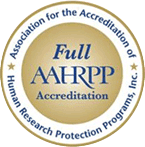Index
OVPR Announces Updated IRB Fee Information for FY2022
Getting on the Same Page: A Three-Part Presentation Series
Get to Know ClinicalTrials.gov (CT.Gov) Protocol Registration and Result System (PRS)
A New HSO/IRB Educational Resource
IRB Advisor Newsletter, March 2021
In the News
OVPR Announces Updated IRB Fee Information for FY2022
By Joanie Hoefer, BS, CIP
The Fiscal Year 2022 fee schedule, effective July 1, 2021, when a UI IRB is the lead IRB is:
- Initial/Full Board review fee of $2,500 per site will be assessed, excluding the lead site review (University of Iowa).
- An additional $1,000 per site fee will be assessed annually for full board continuing review(s) of the protocol, excluding the lead site review (University of Iowa).
- A fee of $1,000 per site will be assessed for an initial/expedited review, excluding the lead site review (University of Iowa).
- An additional $500 fee per site will be assessed annually for continuing review or every two years for biennial review, excluding the lead site review (University of Iowa).
- $0 will be assessed for exempt studies.
Administrative fees for Industry-Sponsored Projects sent to an external IRBs (e.g. WCG) and the VAHCS IRB will remain at the rates established in 2019. Similarly, the review fees for Industry-Sponsored Studies reviewed by the University of Iowa Biomedical IRB-01 will remain the same 2019 rates.
You can find information about IRB Fees in the menu bar under “Contact Us” on the Human Subjects Office website, including the April 12, 2021 memo from OVPR and the current fee schedule, which will be effective through June 2021.
Getting on the Same Page: A Three-Part Presentation Series
In February 2021, the Human Subjects Office (HSO), Division of Sponsored Programs (DSP), and the Institute for Clinical and Translational Science (ICTS) partnered together to present a three-part presentation series on steps the Principal Investigator can take to ensure that review of human subjects research applications and related contracts are finalized within the institutional median goal of 45 working days.
The series began with a focus on the minimum required submission materials for each of the Human Research Protection Program (HRPP) committees that review human subjects research. The “review clock” starts once all the HRPP committees have sufficient submission materials to begin their review(s). The majority of the HRPP committees use one or more of the following materials to complete their review:
- Responses in the HawkIRB application.
- Protocol, investigator brochure, G-12.
- Informed consent document(s).
HRPP committee reviews occur concurrent with one another. Some HRPP committees have specific forms which are required as part of their review process. HRPP forms (paper or electronic) can be accessed via the HawkIRB system, with the exception of the contract and budget for DSP review. An incomplete HawkIRB application could prevent all the HRPP committees from beginning their review, which will ultimately cause approval delays.
DSP also conducts a concurrent review of the contract and draft budgets (if both are submitted in UIRIS) while the HSO/IRB and other HRPP committees complete their reviews. Failure to submit the draft contract and budget will also cause a delay in review. The HSO and DSP strongly encourages research teams to work concurrently with departmental grant administrators to submit IRB applications, HRPP forms, the contract, and budget.
Part two of the series focused on real case examples of human subjects research submissions and contracts that were finalized both within, and outside of, the 45-working day institutional review window. An analysis of why the institutional deadline was or was not met was included for each case example. Essentially, research applications that were complete when submitted and where the research team addressed HSO/IRB, DSP, and other HRPP committee queries in a timely manner, were released prior to the median institutional deadline. Some reasons research application reviews did not meet the median institutional deadline include:
- Incomplete submissions to one or more HRPP committees.
- Submissions to the HSO/IRB, HRPP committees and DSP did not occur in tandem.
- Contract negotiations with the sponsor took longer than expected.
- The research team did not respond to HSO, IRB, DSP, or other HRPP committees’ questions in a timely manner.
- Informed consent and/or master contract templates were not used.
- HSO/IRB/HRPP committee delays.
- Budgets were not submitted or finalized in a timely manner.
- Incorrect Facilities & Administrative (F&A) rates used in the budget.
The presenters also provided a summary of best practices for HawkIRB submissions and HRPP improvements that are currently underway.
The last part of the series focused specifically on budget preparation. The ICTS presenter provided a thorough summary of budget best practices, instruction on how to draft a budget, and what is necessary for preparing a research budget such as:
- Required materials (e.g. protocol, lab manuals, pharmacy manuals, investigator brochure).
- Schedule of study events which includes which procedures are standard of care and which are research-specific procedures.
- Sponsor budget examples.
- Ancillary department costs.
- Understanding of recruitment expectations.
- Staffing needs to conduct the research.
- Who will do the testing, lab work, analysis, etc.
- Appropriate F&A rates, charge sheets, inflation rates.
- One-time, annual, recurring costs.
- Budget template examples.
All three presentations were recorded and are available to anyone with a HawkID in the IRB ICON Course for Researchers in the ‘Additional Topics’ section.
Get to Know ClinicalTrials.gov (CT.Gov) Protocol Registration and Result System (PRS)
By Fozia Ghafoor, MBBS
ClinicalTrials.gov is a database of privately and publicly funded clinical studies that are being conducted around the world. The purpose of this database is to provide easily accessible information about clinical trials to the public. The website is maintained by the National Library of Medicine (NLM) at the National Institutes of Health (NIH). Information on ClinicalTrials.gov is provided and updated by the sponsor or principal investigator of the clinical study. Studies are generally registered when they begin, and the information on the site is updated throughout the study. All Applicable Clinical Trials (ACTs) that are conducted at the UI must register with ClinicalTrials.gov using the Protocol Registration and Result System (PRS). This article provides information to help researchers enter information about their clinical trials into the ClinicalTrials.gov PRS along with links to helpful resources on the HSO website.
The best tool to prepare for registration and results reporting is the Getting Started Checklist for ClinicalTrials.gov. This document lays out expectations and considerations, as well as provides links to useful materials such as planning templates.
To register a new study, or submit registration information for a study, you must first log in to the PRS at https://register.clinicaltrials.gov. If you need to set up a new account, contact PRS administrator at ct-gov@uiowa.edu to create an account. To create a new registration record, click on the ‘New Record Quick Link’ or select ‘New Record’ from the ‘Records’ dropdown menu on the PRS home page.
Registration information on the ClinicalTrials.gov PRS is submitted in 13 modules:
- Study Identification: The ‘Unique Protocol ID’ must list your HAWKIRB number (digits only). Indicate your official study title and a brief title. The brief title should be written in plain language. Other relevant information about the identification of the study such as study IDs and acronyms can be entered here.
- Study Status: This section lists relevant study dates and marks the last date the Responsible Party (this is the entity or individual responsible for the accuracy of a study record on the website) verified the content of the record. Information on the study recruitment status, start date, and completion dates is collected.
- Sponsor/Collaborators: Responsible Party information will be identified here. Investigators should select ‘Sponsor-investigator’ as the Responsible Party type, unless otherwise directed by the PRS administrator. For studies using an Investigational New Drug (IND) product which is registered by a PI who is not the sponsor-investigator of the study, contact the PRS administrator at ct-gov@uiowa.edu.
- Oversight: IRB information will be identified here, as well as information on the FDA regulated drug or device product. The UI IRB information should be listed as:
Board Name: IRB-01
Board Affiliation: University of Iowa
Phone: 319-335-6564 Email: irb@uiowa.edu
Address:
Human Subjects Office/IRB
Hardin Library, Office 105
600 Newton Road
Iowa City, IA 52242-1098
- Study Description: A detailed and brief description of the study. The brief description should use plain language.
- Conditions: Conditions/diseases studied will be selected. Keywords can also be identified. This information is used by the search function on the public site.
- Study Design: Study type will be selected either as Interventional or Observational along with primary purpose of the study and study phase as mentioned in HawkIRB.
- Arms/Groups and Interventions: Detailed information about the study arms (displayed on the site in rows) and interventions (displayed on the site in columns).
- Outcome Measures: The primary purpose for conducting the clinical trial. Information should be specific (e.g., effect being measured, scale or tool used, grades of the scale, etc.) Secondary outcomes can also be listed.
- Eligibility: Information about the subjects being accepted in the study and any inclusion/exclusion criteria should be listed. This information is relevant to subjects using the site as a recruitment tool.
- Contacts/Locations: Primary contacts from the coordinating center, as well as a list of each site involved in the study.
- Individual Participant Data (IPD) Sharing Statement: Yes/No statement about sharing individual participant data. If ‘Yes’ is answered, a plan must be described. This section meets the International Committee of Medical Journal Editors (ICMJE) requirement for disclosure of a data sharing plan.
- References Section: Currently optional. Use to link to previous research and other personal publications. This section is helpful for those using the public site to review previous research in a particular area.
In August 2020, the HSO has added a new feature that will automatically push key CT.gov fields from IRB approved information in HawkIRB to the CT.Gov PRS system. Keep an eye out for additional information on this topic in the May IRB Connection. For additional assistance or questions about registering a clinical trial on ClinicalTrials.gov or using the PRS, please contact us at ct-gov@uiowa.edu or 319.335.6564.
A New HSO/IRB Educational Resource
By Kelly O’Berry, BS, CIP
The Human Subjects Office (HSO) and the Institutional Review Board (IRB) have a new educational resource that provides basic information and hyperlinks to resources all in one place. HSO/IRB Overview and Educational Resources is posted on the Education and Training page of the HSO website and should be useful for onboarding and training new faculty, staff and student researchers.
The document also includes an overview of the:
- HSO
- IRB
- HawkIRB eResearch application system
- Human subjects protection training requirements in the Collaborative Institutional Training Initiative (CITI) Program
The Human Subjects Office welcomes your suggestions of other resources that would be useful for new and experienced researchers. Please send ideas to irb-outreach@uiowa.edu.
IRB Advisor Newsletter, March 2021
By Kasey Lockett, BA
IRB Advisor (a publication of Relias) is a monthly newsletter with articles about issues facing IRBs, Human Research Protection Programs (HRPPs) and researchers. Current and past issues of IRB Advisor are posted in the “IRB ICON Course for Researchers” which is accessible to anyone with an active UI HawkID. The portal to this ICON Course is on the Education and Training page of the Human Subjects Office website.
This month we highlight an article from the March 2021 issue about the impressive speed and efficiency demonstrated by HRPPs and IRBs in response to sudden changes brought on by the COVID-19 pandemic.
Study Shows Research Programs and IRBs Responded Quickly to the Pandemic
As the COVID-19 pandemic began to sweep the nation in March 2020 many universities and research institutions moved to remote work environments. Investigators from the University of Toledo HRPP wanted to find out how this affected the work of HRPPs and IRBs across the United States. What they found was encouraging, as the vast majority of respondents said their IRB was accommodating to changes in processes and policies implemented by their institution. Furthermore, COVID-19 research in particular was made a top priority as 72% of participants said they believed their COVID-19-related projects were reviewed and approved even faster than usual. Much of the success in moving to remote work can be attributed to most larger research institutions utilizing an electronic IRB submission system – such as HawkIRB used at the University of Iowa.Additional articles in this issue:
- Researchers and IRBs Reconsider Minimal Risk After Trial Results
- IRB Reduces Student Study Review Time from 65 Days to 8 Days
- IRB Improves and Simplifies Board Meeting Minutes Process
- Prominent Pastor, Scientists, Researchers Seek to Ease Vaccine Fears in Minority Populations
In the News
- Study suggests role of sleep in healing traumatic brain injuries, Science Daily
- What fueled humans' big brains? Controversial paper proposes new hypothesis, Live Science
- On-the-Spot Gene Readouts Offer Clues to How Cells Work, NIH Directors Blog
- Scientists Grow Mouse Embryos in a Mechanical Womb, The New York Times
- Scientists stunned to discover plants beneath mile-deep Greenland ice, Science Daily






